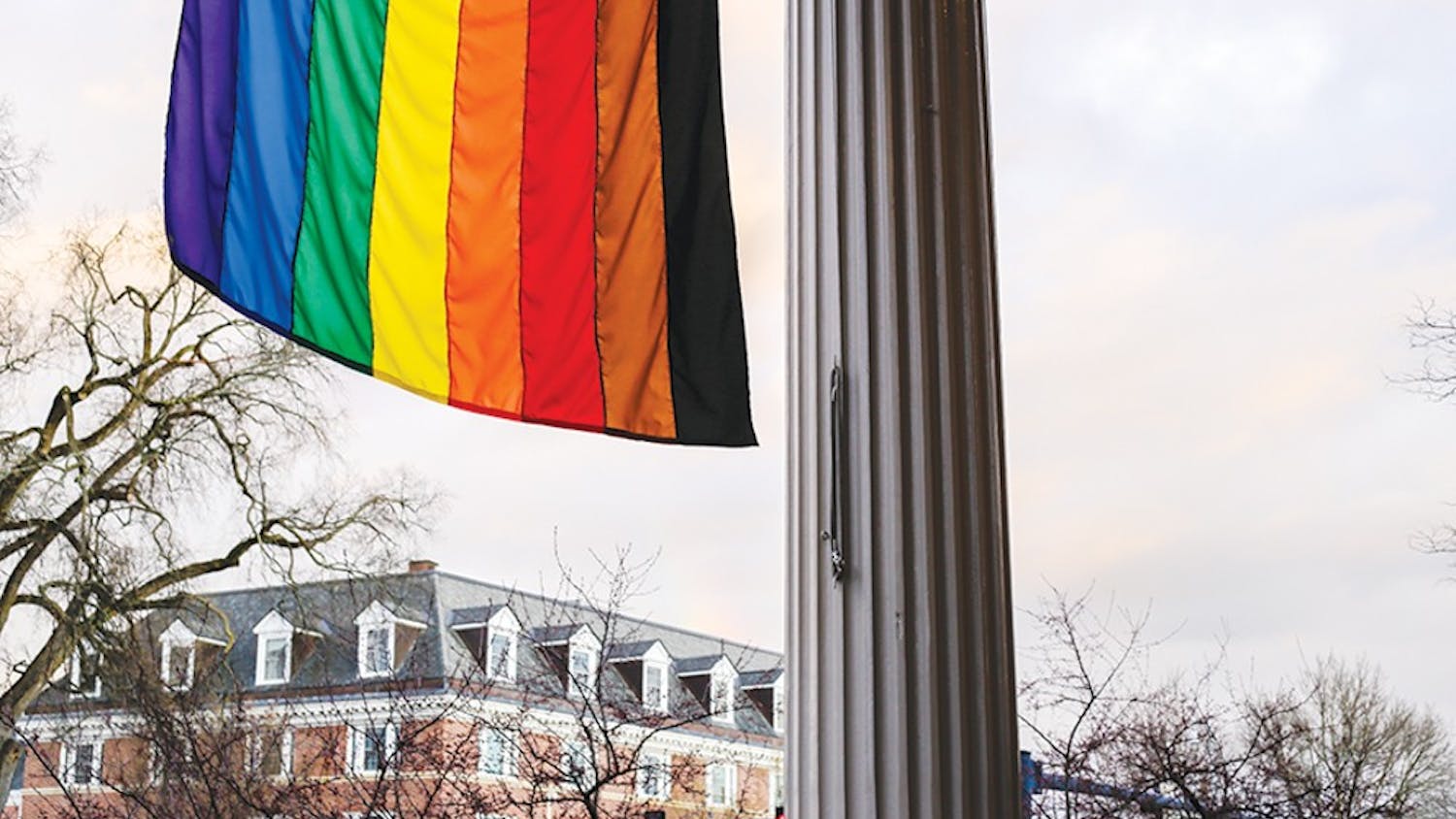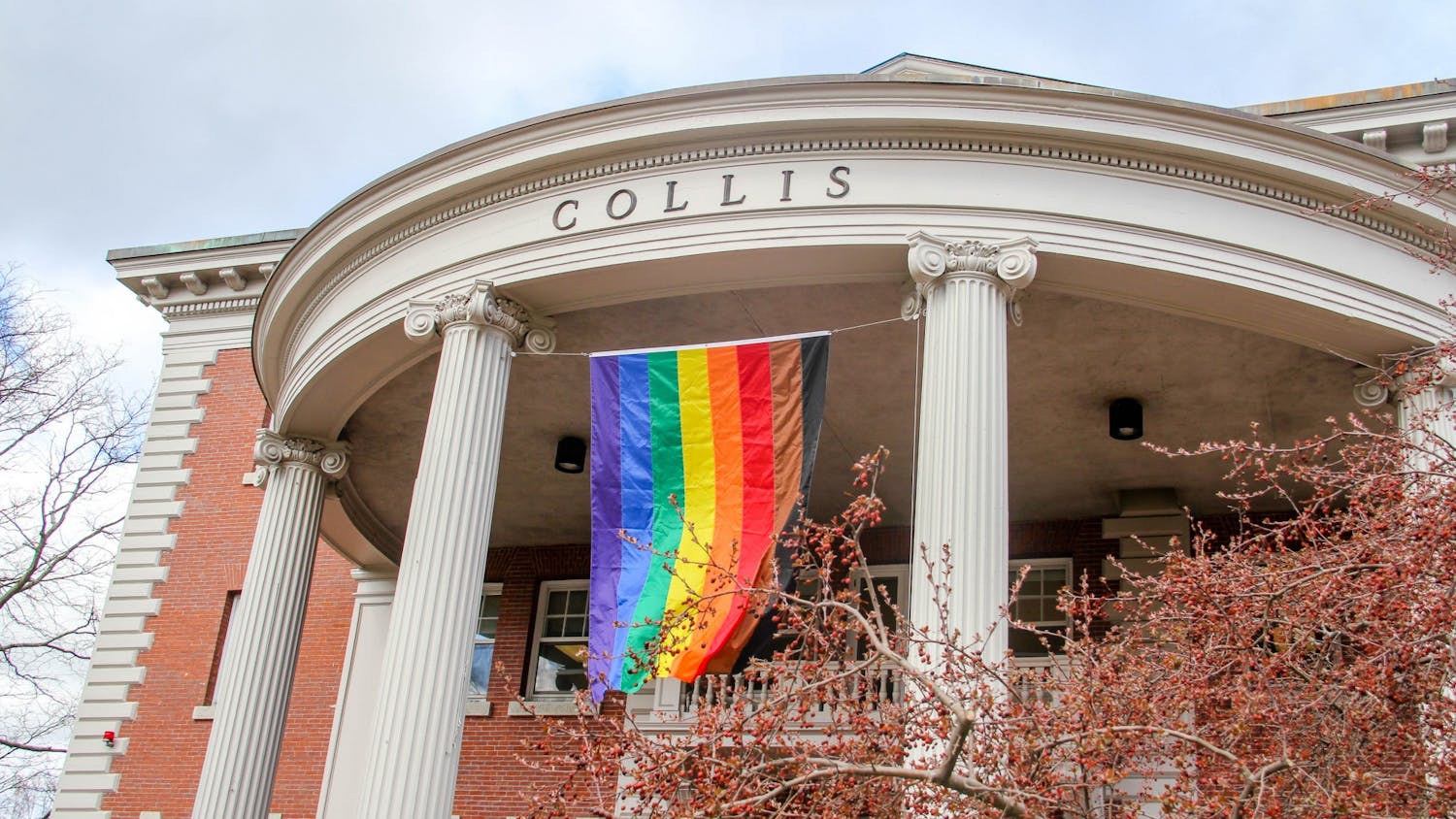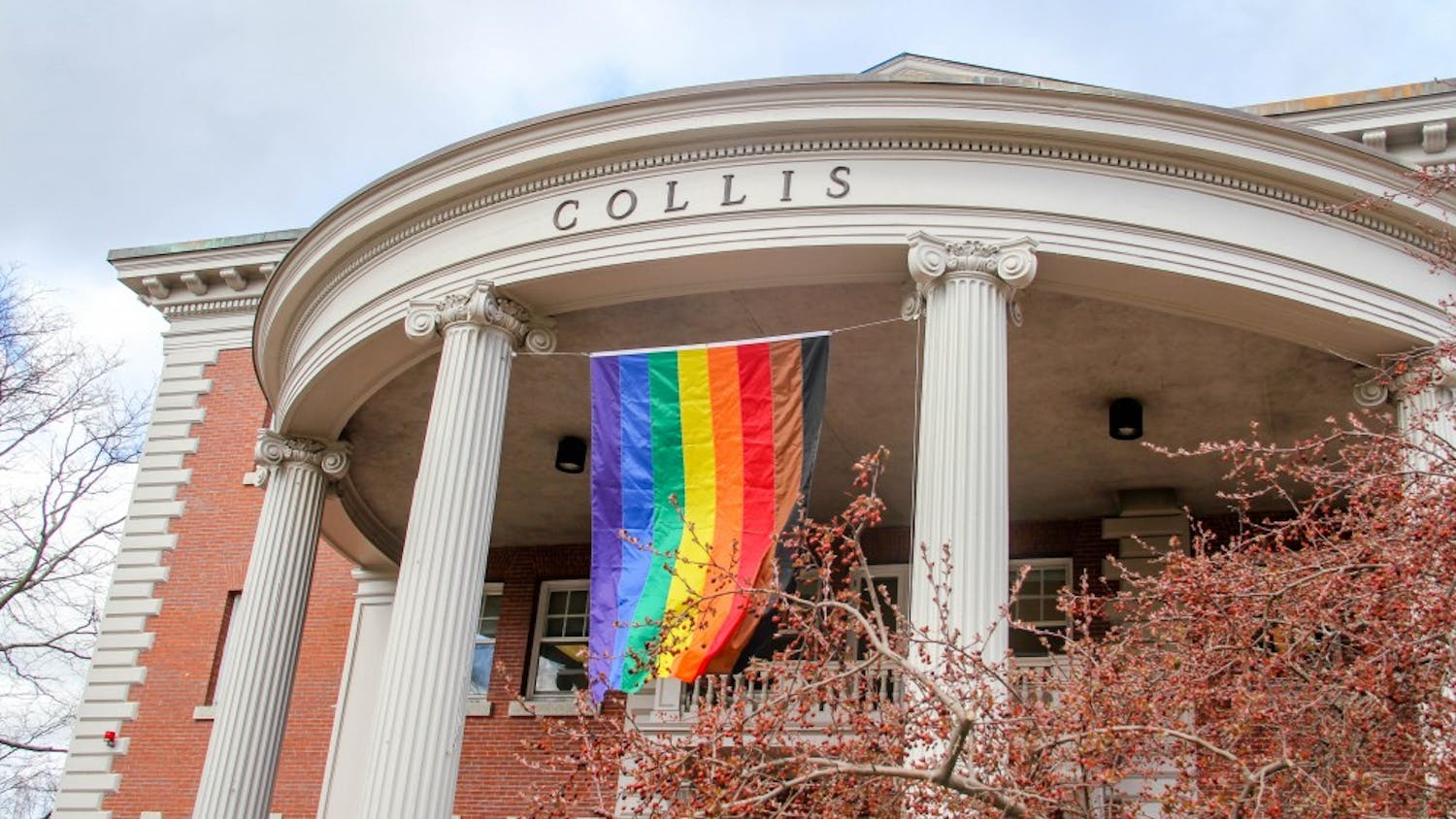The 13th annual celebration of LGBTQIA+ Pride — “Different Strides, One Pride” — strove to unite disparate identities within the queer campus community. Perceived by many members as fragmented, the LGBTQIA+ campus community banded together at events like Queer Prom, Transform and Lavender Graduation. The Pride programming committee also coordinated with the administration to showcase a rainbow flag in front of Collis and project rainbow lights onto Dartmouth Hall. From April 19 to May 3, students of diverse identities witnessed this display of unity — an unfamiliar sight to previous graduating classes at the College.
In the 1980s, Dartmouth’s LGBTQIA+ community largely operated in secret. Most queer students were closeted due to the College’s intolerant social culture, according to former Dartmouth LGBTQIA+ Alumni Association president Brendan Connell, Jr. ’87.
“I think [most students being closeted] was in part due to the times, when being part of our community was not generally accepted in society,” Connell said. “But at Dartmouth in particular, the atmosphere was not one that encouraged people in our community to come out.”
Connell said he attributes students’ fears to the foreboding presence of The Dartmouth Review, the College’s conservative publication. During her tenure as editor-in-chief of the newspaper, Laura Ingraham ’85 directed writers to “persecute” members of the LGBTQIA+ community and, in some cases, out them publicly, according to Connell.
“[The Dartmouth Review] was very aggressive,” Connell continued. “It was definitely an environment wherein [The Dartmouth Review] did everything it could to make life miserable for the people in [the LGBTQIA+] community.”
At a Gay Students Association meeting, Teresa Polenz ’87 went undercover and published a transcript in The Dartmouth Review per Ingraham’s instruction. In a 1997 opinion piece titled “Test of Devotion,” Ingraham admitted she “ignited a major campus controversy” after the transcript scandal.
Connell noted that the College’s conservative ideological landscape extended to the administration, albeit more subtly than The Dartmouth Review.
“The administration wasn’t actively making life unpleasant for LGBTQIA+ students,” Connell said. “But it wasn’t proactive in making life better for them.”
Thirty years later, current president of Dartmouth’s LGBTQIA+ Alum Association Melanie Pastuck ’11 attended the College in its more progressive stages. A member of the Dartmouth women’s rugby team and Sigma Delta Sorority, Pastuck said she felt embraced by her communities.
“The experiences I had [at Dartmouth] were robustly positive and affirming,” Pastuck said. “Not only was I accepted, but I was cared for and celebrated for all the aspects of who I am.”
However, Pastuck posed a caveat that many students felt their identities ostracized them from the broader Dartmouth community. She added that, absent affirming communities, many LGBTQIA+ students felt like social pariahs.
Pastuck graduated from the College just before the landmark 2015 civil rights case of Obergefell v. Hodges, which legalized same-sex marriage. Her peers’ opinions mirrored national sentiment at the time — support abounded, but some remained intolerant.
“When I was a student, we were right on the verge of national marriage equality, and the public image of gayness was very much on the rise,” Pastuck said. “There were students who had opinions of an [unfavorable] nature on campus, and I was aware of that, not necessarily in a hateful way but in an insidious way.”
During Pastuck’s time at Dartmouth, three coeducational fraternities — Alpha Theta, Phi Tau and the Tabard — served to embrace various gender identities; the Office of Pluralism and Leadership offered advising to students; and Dartmouth Pride held annual events. After her graduation, Triangle House — an LGBTQIA+ residence — opened in 2014. The house, located on 4 North Park Street, accommodates 27 people and hosts intellectual and social events for LGBTQIA+ members and allies. The following year, Spectra, a club designed for LGBTQIA+ members and allies, was resuscitated from dormancy. Additionally, in 2015, Connell founded the Rauner Special Collections Library’s SpeakOut project, an oral history of LGBTQIA+ alumni experiences.
Connell said that when he realized alumni with valuable perspectives were passing away, he wanted to preserve the LGBTQIA+ campus community’s timeline. He approached digital collections and oral history archivist Caitlin Birch with an idea: The library would record and collect interviews with LGBTQIA+ alumni to share with the Dartmouth community. Birch said Connell wanted to document the adversity and triumph experienced by a historically marginalized group.
“One of the primary reasons that interviewees have decided to share is because they hope that Dartmouth is a better place today than it was when they were here,” Birch said. “They hope [Dartmouth] will continue to improve as we focus on the experiences that they had.”
On Jan. 29, 2015, College President Phil Hanlon announced the Moving Dartmouth Forward initiative, which outlined a vision for Dartmouth including heightened inclusivity and representation. The initiative strives, among other aims, to address prevailing issues in the College’s LGBTQIA+ community. Connell emphasized the importance of faculty and staff diversity.
“Even with a more robust queer studies program, it could be even richer with more representation,” Connell said. “Dartmouth has made progress, but there’s a lot more work to do.”
Despite the College’s advancements toward social progressivism and LGBTQIA+ acceptance, some current students feel unwelcome.
El González ’18 said they have felt less welcome as their time has progressed at the College. When Spectra became inactive, González and their partner attempted to kickstart the “Q” club for members of the queer community. The Council on Student Organizations reacted negatively to the proposal and questioned the necessity of a second LGBTQIA+ club on campus, according to González.
“It was a month-long process,” González said. “[The Council on Student Organizations] said there can’t be two queer organizations on campus, which was blatantly homophobic.”
González added that, if the College is willing to maintain several dance and a cappella groups on campus, a second queer organization should not be an issue.
“Queer people are first and foremost people, and not all of us want to hang out with each other,” González said. “[The College] assumes everyone in the entire queer community, with all their different identities, is going to be served by one club.”
The “Q” club difficulty highlights a broader issue at the College: the LGBTQIA+ campus community has few social spaces, according to González. Most recently, in 2018, the Rainbow Room — a community-oriented space for queer people and allies — was relocated from Robinson Hall to Triangle House, which is located on the margins of campus.
“[Triangle House] is [far from] the center of campus and it’s a residence hall,” González said. “It’s no longer a space where people can gather without disturbing the people who live there.”
González added that queer students posited “resounding” support for keeping the Rainbow Room in Robinson Hall. When the College ignored these requests, many queer students felt that the administration does not listen to them, according to González
Additionally, many sources said that Greek houses, most of which present as heterosexual, cisgender spaces, serve as the social epicenter of campus. According to them, the Greek-centric social scene perpetuates a heteronormative culture, which intensifies issues that were already pervasive.
Samantha Locke ’22 said she feels she belongs to queer social spaces, but Greek houses often exacerbate the divide between bisexual people and the rest of the queer community. Especially within most Greek houses, she feels guilty for her “straight passing privilege.” Locke added that she feels she contributes to a culture of oppression because she can blend in with other heterosexual couples.
“When I walk into a [Greek house] with my boyfriend and I act like all the other heterosexual couples there, I feel like I’m perpetuating this culture,” Locke said. “I like to wear queer iconography at [Greek houses] so [the queer community] knows I’m one of them.”
She continued to express her frustration with widespread biphobia on campus. According to her, bisexuality is often construed as a cultural compromise — a fleeting movement that has cachet as younger generations embrace sexual fluidity. People who identify as bisexual must grapple with a queer community that views their sexuality as illegitimate or “not gay enough.”
Locke stressed that Greek houses reflect a broader campus culture — they are not necessarily the source of the issue. She added that she appreciates sororities’ efforts to make non-binary and transgender people feel welcome. The Inter Sorority Council has distributed several emails addressed to “self-identifying women and gender non-conforming people.”
However, Locke and Makale Camara ’21 agreed that Greek houses pose some unique risks. LGBTQIA+ students are at heightened risk of sexual violence, especially within Greek houses. According to the Center for Disease Control’s 2015 National Intimate Partner and Sexual Violence Survey, bisexual, transgender, gay and lesbian people are significantly more likely to experience sexual violence than heterosexual people.
Camara said Greek houses are overwhelmingly wealthy, white, straight and cisgender — the demographic most likely to perpetrate acts of sexual violence, according to Camara.
“Queer people — and not just white women but also people of color — are in more danger of experiencing sexual violence,” Camara said. “That’s a nation-wide trend, but at Dartmouth in particular the [Greek houses] are really unsettling.”
Over the past 250 years, the College has expanded the availability of resources for LGBTQIA+ members, but Kai Frey ’22 said they still feel trapped in a toxic, heteronormative campus culture. Beyond prevailing social issues, Frey feels faculty and staff are ill-equipped to handle students of different sexual and gender identities. Most noticeably, professors, administrators and Dick’s House counselors fail to address students with the proper pronouns — an issue that stems from inadequate training, according to Frey.
“People often revert back to the wrong pronouns because of how I look — even if I introduce myself and my pronouns when I meet them, they will likely forget,” Frey said. “I don’t like to stand up to the authority figure in the room, so I usually won’t say anything.”
The “intersectionality theory” asserts that queer people of color experience multiple sources of oppression: the hardship associated with their sexual and gender identity and their racial identity. The Class of 2022 is 65 percent white — and the small percentage of minorities on campus are majority straight and cisgender. Moreover, according to the College’s 2015 Annual Report on Faculty Diversity and Inclusion, racial minorities comprise only 17 percent of faculty. The report does not include LGBTQIA+ statistics, but Camara and González said they had not encountered any LGBTQIA+ identifying faculty. Low-socioeconomic status students are also underrepresented at the College — only 18 percent of the undergraduate Class of 2022 belongs to a “low-income household.” Camara, González and Carlos Polanco ’21 reported they frequently experience microaggressions and stereotyping — all of which they largely attributed to the College’s lack of representation.
Additionally, Camara explained that many queer students of color feel uncomfortable since they have yet to receive reparations from the College, which they said has a well-documented history of racism, misogyny and homophobia.
“The College has been told repeatedly exactly what it needs to do,” Camara said. “At this point, the College has communicated it doesn’t care and we feel unwelcome here.”
Polanco added that queer people of color experience more difficulty adjusting to life at Dartmouth than white, gay students.
“Being a white, gay male is a lot more palatable,” Polanco said. “When you’re a person of color and also gay on Dartmouth’s campus, especially if you’re black, you experience different treatment from the broader community.”
There is a breadth of experiences lived by members of the LGBTQIA+ community on campus. González said that members of the LGBTQIA+ community lead radically different lives. They continued that the blanket term “LGBTQIA+” helps recognize an expansive group of marginalized people, but it shrouds an often misunderstood reality: every person in the LGBTQIA+ community is unique.
“Queer people are like any other people — we’re all different,” González said. “If you asked a random straight person if they have a lot in common with all straight people, they would say no and that’s something people often overlook for queer people.”



